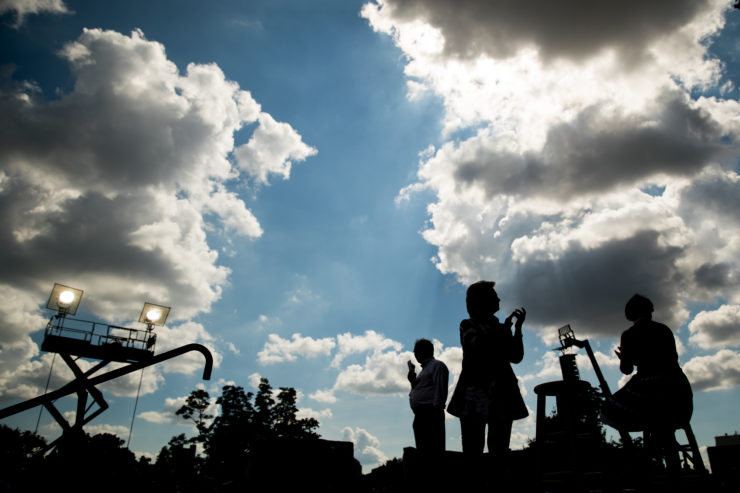
Hillary Clinton and Tim Kaine at a July rally at Fort Hayes Metropolitan Education Center in Columbus, Ohio, part of a three-day bus tour through the Rust Belt
I come from a fading industrial town—Albion, Michigan. In 1985 I would read the Chicago Tribune on how great things were in America and wonder which America it was writing about. My America, three hours from Chicago, was still mired in the nasty recession of the early 1980s. Things weren’t so great nearer to the city, either, in places like Moline and Joliet and Gary. But things were great for certain members of the service economy, especially those connected with Wall Street, where fortunes were being made as stock markets recovered from a long slump.
My hometown wasn’t in the midst of a recovery. Over the next 20 years it went from being a factory town with a small college to a college town with a small factory. This transition to the knowledge economy failed for most of the people who lived there. The media—print, broadcast and, later, Web—seemed indifferent. When it covered places like mine, it practiced tourist journalism, with reporters sending back postcards saying, in effect, “Wish I weren’t here.”
And why should reporters want to go there? Media audiences are people who couldn’t wait to get out of their town or village or mid-sized city, or can’t imagine who wouldn’t. People who don’t yearn for N.Y. or D.C. or L.A. don’t really matter in the national debate. God forbid they practice a religion, which as reported often appears to exist primarily as a sop for reactionaries or a spark for radicals.
The disconnect has maddened me for years. How could we mostly ignore that domestic policy simply turned away from the millions of Americans—up to a fifth of the U.S. population, by some estimates—who live in once thriving industrial areas?
To be clear, I don’t blame the media for the plight of my town. Even if the media were hyper-focused on the issues that matter to less well-educated people not working in the knowledge economy, it couldn’t stop technology from changing, factories from aging, or other nations from developing. But it – we – often could do a better job of walking around the country, instead of flying over and looking down on it.
I spent some time after my Nieman fellowship working on something that would be a cross between Davos and the Aspen Roundtable to address some of the issues of legacy cities in the U.S. Events like these can be heady; people parachute in, trade grand thoughts with other elites, then head off in search of the next big thing. But such confabs almost by definition turn places into also-rans and people into afterthoughts. These left-behinds make up a large and growing percentage of the population in developed countries. We hear a lot in the U.S. about angry working-class white males, but 70 percent of Americans over 25 don’t have college degrees. These people increasingly hear that they have no social mobility and limited prospects. What we’ve seen in election after election over the last year is that such people are no longer going to live in quiet desperation.
I asked myself why we gather a bunch of smarties in resort towns and cosmopolitan cities that don’t really need them? This just creates a kind of clique economy, where the cool kids or the nerds do their thing at the expense of everyone else. Why not get them to commit time – at least a year – and resources (new ideas, expertise, management talent, maybe even some money) to places with the difficult problems that come from having out-of-date human and physical resources. They’d work closely with local civic, business, political, and cultural leaders to address these problems.
Journalists like me could help organize community journalism efforts modeled after ones established by Ethan Zuckerman at MIT’s Center for Civic Media. Reporters would follow these projects, helping keep the local community informed but also reporting ideas that other communities could try. Major media companies and foundations might offer training, mentoring, and other support, and perhaps in return get access to deeper reporting than they typically would get from such places.
But in some preliminary conversations I realized I would look like a carpetbagger in a place I’m no longer from, just another urban coastal dweller telling the rest of the country how fucked up it is.
In a way, the challenge I found is the same one journalists face whenever they start a new beat, or a new topic. We are always outsiders at first, with no relationships, no trust, and very little knowledge. These take time to develop, and some luck. One way to overcome the outsider problem would be to tap ex-pats who still care about the communities they are from. They would have relationships and a sense of the problems that exist, and probably even some ideas that would appeal to the community.
I can’t promise this sort of thing would restore greatness to mid-sized cities that maybe never were great. But it might reverse decades of getting worse, and build bridges across a growing societal divide.



